This website will look much better in a web browser that supports web standards, but it is accessible to any browser or Internet device.
| Begona Arano European Commission |
|
|
Begoña Arano was born in Madrid (Spain). She studied Biological Sciences at the Universidad Complutense de Madrid where she completed an MSc in Zoology. Shortly after she started working on her PhD funded for two years by the DAAD and for one year by the Royal Society. After obtaining her PhD in 1988, she held various research positions at the Spanish Research Council (C.S.I.C). In 1996 she was awarded an individual Marie Curie Fellowship to work for 2 years at the Department of Biological Sciences of the Open University in the UK. In 1998 she joined the European Commission as a Scientific Officer at Directorate-General for Research, within the Unit for Marie Curie Fellowships (Improving Human Potential Programme). Since 2005 she has been working as Assistant to the Director for The Human Factor, Mobility and Marie Curie activities within Directorate-General for Research. |
| Laura Apostol European Commission |
|
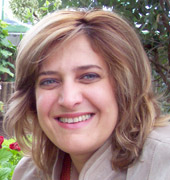 |
Laura Apostol was born in Buzau (Romania). She studied Engineering Sciences at the University Polytechnic from Bucharest where she completed the diploma in Hydraulic Machines, in 1991. In 2000 she started working on her MSc in management and business administration at the same university. She obtained her MSc in 2002. She was starting to work in the Ministry of Education and Research in 1992 as an expert. From 1994 she was working at the Romanian National University Research Council, first as World Bank Program Manager, then as Head of the Research Funding Department. She was involved in implementation of the Reform for Higher Education and Research in Romania , in settle of monitoring, evaluation and audit procedures and methodologies of the research grants, in distribution of the budgetary founds for research, in impact assessment of the World Bank Loan for Higher Education and Research Reform Project In September 2003 she was delegated to the European Commission as detached national expert. She is the Project Officer dealing with the Chemistry Panel within the framework of the Directorate-General for Research, the Unit for Marie Curie Fellowships (Improving Human Potential Programme). |
| Florent Bernard European Commission |
|
 |
Florent Bernard was born in Brussels in 1975. He studied Biological Sciences at the Université Libre de Bruxelles. During his studies, he spent a year at the Universita degli Studi di Firenze (Italy) as an Erasmus fellow and another year at the University of Georgia (Athens, USA) as a GRSP fellow. He then started a Ph.D. in Cell Molecular Biology funded by the Belgian research fund (FRIA - FNRS) at the Institut de Biologie et Médecine Moléculaire. After obtaining his Ph.D. in 2001, he developped a multidisciplinary research project at the Universitat de Barcelona in collaboration with the Université Libre de Bruxelles. The project aimed at studying human cultural behaviour taking into account various fields of science such as primatology, cognitive science, neurobiology, anthropology and sociology. In 2005 he joined the European Commission as a Scientific Officer at Directorate-General for Research, within the Unit for Marie Curie Research Training Networks. |
| Karim Berkouk European Commission |
|
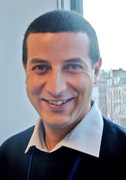 |
Karim Berkouk was born in 1970 close to Toulouse in France. He studied Fluid Mechanics at the University of Paul Sabatier (Toulouse) before completing his PhD at the University of Warwick (UK) in bio-fluid mechanics (1999). He then held various research positions in Exeter (UK), INSERM (Caen, France) and the University of Cambridge (UK), where he mainly focused on brain medical images. Since 2004, he has worked for the International and Individual Fellowships Unit in the Directorate General for Research as a project officer for the International Fellowships schemes and as call coordinator across all Individual Marie Curie Actions. Since 2005, he had coordinated the evaluations of all Marie Curie Actions. |
| Sergio Di Virgilio European Commission |
|
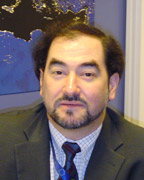 |
Italian born in 1961, Sergio Di Virgilio is Docteur ès Sciences and Chemical Engineer. He is currently Scientific Officier with the Research Training Networks Unit in the Human Factors, Mobility and Marie Curie Activities Directorate D at Directorate-General for Research. He was trained as a chemist and specialised in Biochemistry and Bioengineering at Faculty of Sciences of the Université Libre de Bruxelles (ULB). While working part-time for the Institut de Phonétique of ULB, he shared his research time between the Centre d'Etude Nucléaire (CEN/SCK) Department of Radiobiology and Nuclear Medicine, in Geel, the Department of Gynaecology and Obstetric of the University Hospital St Pierre and the pharmaceutical company SMB-Galephar. In 1989, he obtained his D.Sc. degree in Molecular Glycobiology from the Laboratory of Protein Chemistry, School of Medicine and Pharmacy, ULB. During a first post-doctoral training at the Vrije Universiteit Brussels, he specialised in carbohydrate chemistry in the field of parasitology and cellular immunology and was teaching Glyco-immunology at the Graduate School of Molecular Biology and Biotechnology. From 1992 until 1998 he was at the Complex Carbohydrate Research Center at the University of Georgia , USA . As a Senior Postdoctoral Research Scientist he acquired further expertise in protein-carbohydrate interactions, NMR, Chemo-enzymatic synthesis and Artificial Neural Network (funded by the NIH, DOE, NSF and Ross Laboratories ( Abbott , MI , USA ). He has been a Trainee and Visiting Scientist at numerous institutions among which the Université des Sciences et Techniques de Lille I (FR), the Albert Einstein College of Medicine, NY (USA), the Weizmann Institute of Science (IL), the Oxford Glycobiology Institute (UK), the Oklahoma College of Medicine (USA). He also supervised undergraduate, Graduate, Master, PhD and MD/PhD students and held several teaching positions as Maître de Conférence and Assistant Professor. Back in Europe he obtained in 2000 a degree in Chemical Engineering from the Haute Ecole Paul-Henri Spaak with a specialisation in Industrial Environmental Remediation and Management done at the Integrity and Innovation Cell at Pfizer. Before joining the European Commission he also worked for Eli Lilly R&D at the European Clinical Pharmacology & Program Phase Medical as Senior Clinical Pharmacology Coordinator, managing Phase 1 clinical trials in several therapeutic areas (CNS, diabetes, urogenital dysfunction and endocrinology) where he was also Project Manager for the implementation of e-Data Management of pilot Clinical Trials. |
Frank Marx |
|
 |
Frank was born in 1963 close to Aachen in Germany. He has a background in Political Sciences and German Literature and specialised in EU policy. His thesis on EU Regional Policy was published in 1992. Some vocational training in marketing and economics rounded up his profile. He started his professional career as an information officer for the Euregio Maas Rhein (cross-border cooperation between Belgium, The Netherlands and Germany) and gained experiences for a couple of years at the European Department of the German Federal Ministry for Economics. Since 1997 he is working for the European Commission. He developed and implemented a training strategy for the YOUTH programme, did a side step in working for the European Year of People with Disabilities in 2003 and then returned to the area of research, training and education. Since 2004 he is the Scientific Officer for Marie Curie Research Training Networks in the area of Economic Social and Human Sciences. |
| Pavlos Mouratidis European Commission |
|
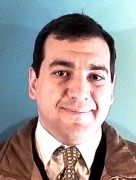 |
Pavlos Mouratidis is currently working as a scientific officer responsible for the Marie Curie Reintegration Grants schemes at the Directorate-General for Research of the European Commission. He was born in Thessaloniki, Greece in 1961 and studied Chemical Engineering at the Aristotelian University of Thessaloniki. He spent one year at Helsinki University of Technology in Finland specialising in polymer science and technology and working as a researcher in the field of biodegradable polymers. He was involved for several years in applied research and development of chemicals and processes for the wood-based panels industry as well as their industrial production and application. He joined the European Commission in 2001 and worked for two years (2001-2003) as a Project Manager at the Institute of Transuranium Elements, in Karlsruhe, Germany, one of the Institutes of the Joint Research Centre involved in research and development work in the nuclear sector. Since 2003, he has worked for the International and Individual Fellowships Unit in the Directorate General for Research as call coordinator for the International Fellowships schemes and as project officer for the Chemistry panel across all Individual Marie Curie Actions. He is currently involved in the Marie Curie European and International Reintegration Grant Actions addressed to experienced researchers and encouraging their professional reintegration following a mobility period abroad. |
| Alice Rajewsky European Commission |
|
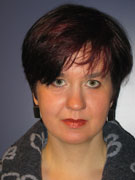 |
Alice works as Project Officer for Marie Curie Host
Fellowships for Early Stage Research Training and the Transfer of
Knowledge in the area of Geo- and Environmental Sciences. She studied
Slavic Philology, Eastern Law and East European History at the universities
of Munich, Cologne, Bonn, Moscow, and Oxford, where she gained a D.Phil
in 1999. In 2000 she started her professional career at the German
Research Foundation (DFG), initially working as Programme Officer
for the DFG’s International Doctoral Training Programme, where she
built up institutional cooperation with Central and Eastern Europe.
In 2003 she moved to the DFG’s international department as Director
for cooperation with Central and Eastern Europe, Russia, and the CIS.
In January 2006 she was delegated to the European Commission as detached
national expert. |